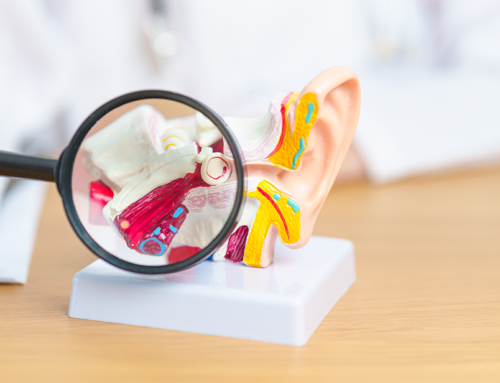Why is early diagnosis and timely provision of cochlear implants for Usher syndrome so important?
What does Usher syndrome have to do with cochlear implants and the European healthcare systems in Europe? This was the topic at the EURO-CIU Symposium on April 5, 2024 in Vienna
Dominique Sturz

Quite a lot! In particular, the genetically confirmed early diagnosis of Usher syndrome is not only of enormous importance for affected families and the CI community, but also for many other players, including the European healthcare systems. Why? This was one of the topics of this year's Euro-CIU Symposium. This presentation was preceded by my long association with CIA and many years of international activities as a CI and Usher ambassador.
While in the late 1990s one had to be satisfied with a rather random clinical diagnosis of deafness (including in my family), today one benefits from standard newborn hearing screening, which detects hearing disorders after birth and is the starting point for the referral of affected families for molecular genetic testing. This allows Usher syndrome to be diagnosed in the first few months of life - before the first signs of photoreceptor cell death appear. What difference does this make?
What are the benefits of early diagnosis?
Benefits for the affected child:
Confirmed early diagnosis gives parents, as the responsible parties, the opportunity to create optimal conditions for their child and, above all, to strengthen them: Treatment of the hearing impairment, other accompanying measures to promote development, what needs to be taken into account in their school career, vocational training, leisure activities, sports, interaction with family and friends. And the children? They simply grow up with it and learn an uncomplicated way of dealing with the effects of this rare disease, which is characterized not only by a hearing impairment (congenital deafness in subtype 1, congenital hearing loss in subtypes 2 and 3 with subsequent deafness), but also by retinal dystrophy due to retinitis pigmentosa, which leads to blindness in adulthood. They are spared the major shock of a later accidental diagnosis as a teenager, for example when the eye test for their driving license is due.
Benefits for the parents:
- Certainty. And the opportunity to be able to classify the often very worrying symptoms: Hearing impairment is accompanied by night blindness, visual field impairment, for example stumbling over objects and impaired visual acuity, i.e. the ability to read, as well as balance disorders in subtype 1.
- Relief. Relief that it is "only" Usher syndrome - i.e. a non-life-threatening condition - and that no further "mysterious" and frightening symptoms will develop
- Preparation. Planning is everything, taking adequate precautions for everyday life and building resilience makes life with Usher syndrome easier.
- Family planning. Information from genetic counseling about the likelihood of other children, other family members or their offspring being affected
- Networking and access to experts. With a confirmed diagnosis, contact can be made with relevant self-help groups and patient organizations as well as experts from the fields of medicine, science and research not only in your own country - but, as is usually necessary and common with rare diseases - all over the world. This provides access to expert information, adequate disease management and future innovative forms of therapy or clinical studies, for which a genetically confirmed diagnosis is a prerequisite.
Benefits for the CI community:
Around one third of the genes responsible for hearing disorders are Usher genes (according to Boston Children's Hospital). Usher syndrome (subtype 1) is present in around ten percent of children with congenital deafness. Over 50% of cases of combined hearing and visual impairment or deafness and blindness are due to Usher syndrome. Children with Usher syndrome subtype 1 (congenital deafness) and those affected with subtypes 2 or 3 can benefit from cochlear implants if they later become deaf.
Benefits for patients in the fields of hearing, vision (retina) and rare diseases:
A strong patient community with a strong network and strong collaborations with clinics, science and research has the opportunity to support each other, generate knowledge, bring in future experts and become active at a political level, representing their interests and helping to shape health policy.
Benefits for clinics, science and research:
Building up expert knowledge not only on the disease itself, but also on disease management, treatment guidelines, referral to expert centers (for example to the members of the European Reference Networks on Rare Eye Diseases ERN-Eye) enable adequate treatment of those affected, avoid incorrect or unnecessary treatments and examinations and thus reduce the burden on those affected. And "incidentally", the healthcare systems are used more efficiently as a result.
Benefits for Europe's healthcare and social systems:
Beyond more efficient utilization, the coding that accompanies genetic diagnosis (ORPHA, ICD10 or 11) can build registries and generate reliable data and numbers that give visibility to those affected in the systems and provide valuable information for science and research as well as for our healthcare systems for planning, management and resource allocation. This also applies to social systems in terms of access to and calculation of social benefits. This takes on particular importance against the background of the creation of the European Health Data Space (EHDS) and the associated data spaces at EU Member State level and the registers to be harmonized at hospital level.
The benefits of molecular genetically confirmed early diagnosis of Usher syndrome therefore go far beyond what one would expect, and ENT experts specializing in hearing solutions therefore have key responsibilities. We can only hope that they are aware of this and that we can continue to count on their support.
 Dominique Sturz
Dominique Sturz
Mother of a grown-up daughter with Usher syndrome, bilaterally implanted with CI in early childhood
CIA Usher contact
Patient representative for Usher syndrome & rare diseases
ePAG ERN-Eye - Chair of the European Patient Representative Group in ERN-Eye
Chairwoman-StV Pro Rare Austria - Alliance for Rare Diseases Austria






